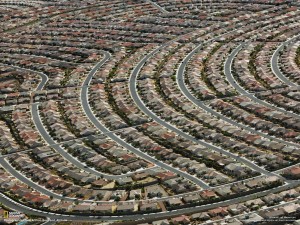The government has certainly had a hand in pushing for electricity, roads, and other forms of public infrastructure in rural areas, but is this for the best?
[extoc]

You didn’t build that!
Oh, what a wonderful gaffe by Obama. But there are a lot of people who believe that without government, infrastructure like rural power grids and roads would never have been possible. Well, the market has a wonderful way of getting done what is necessary and scrapping that which is inefficient. If we really needed such a wide spread infrastructure, it would have developed, but is it really for the best that we have such a system, or has it pushed sprawl and resulted in massive socioeconomic and environmental damages?
Sprawl
One of the largest sources of inefficiency and environmental destruction in this country comes from just how spread out our population is. It makes no sense. What’s even stranger is that it is often less expensive to live out in the middle of nowhere than it is to live in a city. Why? Because the government has largely subsidized the cost.
Would private industry have developed wide spread power grids? I think so, but they probably would have been more efficient, less spread out, and it would most likely be less expensive to live in a city rather than more expensive. Indeed, this means thatt people who decide to live in the city, drive less, walk more, live in more compact areas, and overall live a lifestyle which is far better for the environment are being forced to subsidize those who do the opposite.
Now let’s consider the impact. Cars are needed even for short trips due to sprawl. This results in a large amount of air pollution and of course the dependency of fossil fuels. There are over 2 million miles of paved roads in the United States. To put that in perspective, that’s ten times the distance between the Earth and the moon. A large component of paved roads is petroleum based and that leeches toxins into the environment. There were also about 254 million vehicles registered in 2012.
Of course, there are some negatives. There is a correlation between population density and crime rate, but much of that can be mitigated by proper urban planning. And with the amount of tax revenue saved each year by fewer roads, a smaller power grid, etc, there would have been more money in the pockets of citizens this entire time. And socioeconomic condition is a huge factor in crime rate. In addition, there is evidence that suburban sprawl has actually resulted in an overall increase in societal ills. But is there evidence that the push for infrastructure had an impact on suburban sprawl? Yes. According to a thesis by Nathaniel Baum-Snow of Brown University, it did indeed have an impact.
So was the government necessary for the construction of rural power grids, roads, and other infrastructure? Doubtful. Is it possible that pushing the market to construct such systems was wasteful and ultimately destructive? Quite possibly. But this is again an issue with government solutions to problems. They don’t have all the answers. They cannot account for every unknown, and they cannot adapt easily when the effects of those unknowns arise.
Further Reading
1. It’s a Sprawl World After All: The Human Cost of Unplanned Growth — and Visions of a Better Future (Amazon.com)
2. DID HIGHWAYS CAUSE SUBURBANIZATION?
3. Economy and Government: an Evolutionary Perspective (Politicoid)

